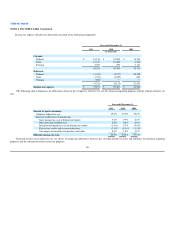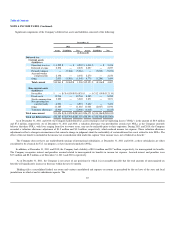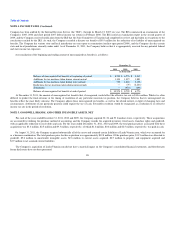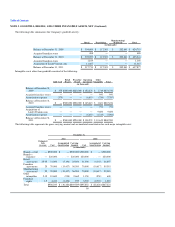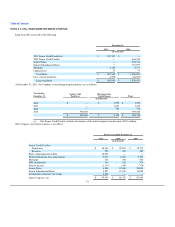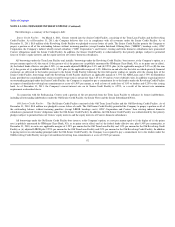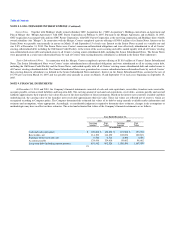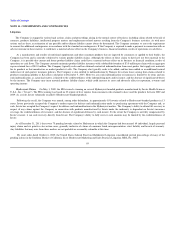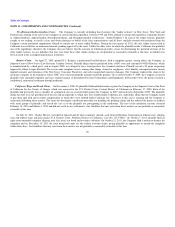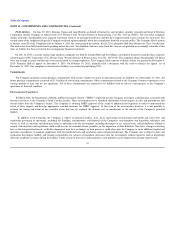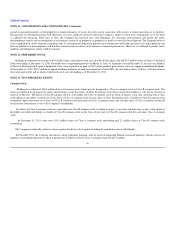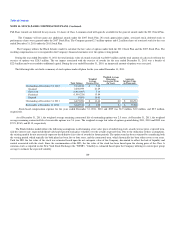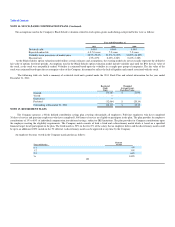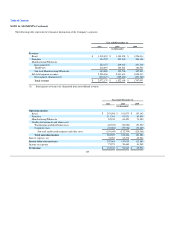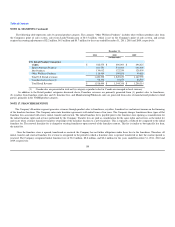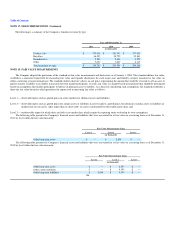GNC 2012 Annual Report Download - page 101
Download and view the complete annual report
Please find page 101 of the 2012 GNC annual report below. You can navigate through the pages in the report by either clicking on the pages listed below, or by using the keyword search tool below to find specific information within the annual report.
Table of Contents
NOTE 11. COMMITMENTS AND CONTINGENCIES (Continued)
Pro-Hormone/Androstenedione Cases. The Company is currently defending three lawsuits (the "Andro Actions") in New Jersey, New York and
Pennsylvania relating to the sale by the Company of certain nutritional products, between 1999 and 2004, alleged to contain the ingredients commonly known
as Androstenedione, Androstenediol, Norandrostenedione, and Norandrostenediol (collectively, "Andro Products"). In each of the Andro Actions, plaintiffs
sought, or are seeking, to certify a class and obtain damages on behalf of the class representatives and all those similarly-situated who purchased from the
Company certain nutritional supplements alleged to contain one or more Andro Products. During the first quarter of 2011, the sole Andro Action filed in
California was settled for an immaterial amount, pending approval by the court. Unlike the other states in which the plaintiffs reside, California law prohibits
one of the ingredients; therefore, the Company does not believe that the outcome in California provides a basis for determining the potential outcome of the
other Andro Actions. As any liabilities that may arise from these other Andro Actions are not probable or reasonably estimable at this time, no liability has
been accrued in the accompanying financial statements.
Romero Claim. On April 27, 2009, plaintiff J.C. Romero, a professional baseball player, filed a complaint against, among others, the Company, in
Superior Court of New Jersey (Law Division/ Camden County). Plaintiff alleges that he purchased from a GNC store and consumed 6-OXO Extreme, which
is manufactured by a third party, and in August 2008, was alleged to have tested positive for a banned substance. Plaintiff served a 50 game suspension
imposed by Major League Baseball. The seven count complaint asserts, among other things, claims for negligence, strict liability, misrepresentation, breach
implied warranty and violations of the New Jersey Consumer Fraud Act, and seeks unspecified monetary damages. The Company tendered the claim to the
insurance company of the franchisee whose GNC store sold and allegedly misrepresented the product. On or about October 9, 2009, the Company answered
plaintiff's first amended complaint and cross-claimed against co-defendants Proviant Technologies and Ergopharm. In December 2011, the parties reached a
confidential, immaterial settlement through mediation.
California Wage and Break Claim. On November 4, 2008, 98 plaintiffs filed individual claims against the Company in the Superior Court of the State
of California for the County of Orange, which was removed to the U.S. District Court, Central District of California on February 17, 2009. Each of the
plaintiffs had previously been a member of a purported class in a lawsuit filed against the Company in 2007 and resolved in September 2009. The plaintiffs
allege that they were not provided all of the rest and meal periods to which they were entitled under California law, and further allege that the Company failed
to pay them split shift and overtime compensation to which they were entitled under California law. Discovery in this case is ongoing and the Company is
vigorously defending these matters. The court has developed a mediation procedure for handling the pending claims and has ordered the parties to mediate
with small groups of plaintiffs and stayed the case as to the plaintiffs not participating in the mediations. The first of the mediation sessions occurred
February 10, 2010 and March 4, 2010 and did not result in any settlements. Any liabilities that may arise from these matters are not probable or reasonably
estimable at this time.
On July 21, 2011, Charles Brewer, on behalf of himself and all others similarly situated, sued General Nutrition Corporation in federal court, alleging
state and federal wage and hour claims (U.S. District Court, Northern District of California, Case No. 11CV3587). On October 7, 2011, plaintiff filed an
eight-count amended complaint alleging, inter alia, meal, rest break and overtime violations. On October 21, 2011, the Company filed a motion to dismiss the
complaint and on December 14, 2011 the court dismissed count six (the federal overtime claim) giving plaintiffs an opportunity to amend the complaint
within thirty days. Any liabilities that may arise from these matters are not probable or reasonably estimable at this time.
96


